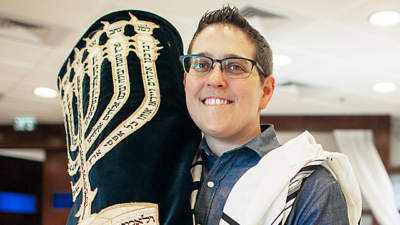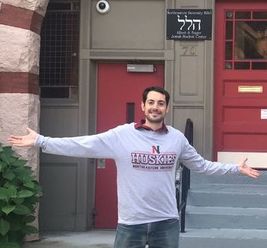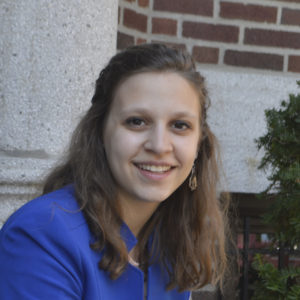This is part 3 in a series about politics, identity, and Jewish community on college campuses. Click here to view part 1, and here for part 2.
Ben Novak came to Northeastern University in 2016 from a Catholic high school in Kingston, Massachusetts. His father was raised Jewish, and his mother converted to Judaism before he was born. Novak wanted to find his own Jewish community in college, a place where he could grow.
“Getting to college, my goal was to figure out, what does being a Jewish kid mean when you are not The Jewish Kid?” said Novak, now a third-year student. “What does it mean to be Jewish for my own sake, without something to be compared to?”
After a difficult first year, Novak connected with the university’s new Jewish spiritual life advisor, Rabbi Becky Silverstein (he/him/his), who was hired in April 2017 as the first visible transgender Jewish professional in the spirituality center. Novak became involved in the Talmud learning community, the Muslim-Jewish interfaith group, and the Jewish Student Union — all spaces the rabbi facilitated or created. But then, in May this year, Novak received some bad news: the university was reallocating resources, and Silverstein’s contract had not been renewed.
Novak was angry, and he was not the only one. The three groups he participated in, along with a Jewish LGBTQ+ group that the rabbi also led, were now without their main advisor. Students got organized, met with Robert Jose, the associate dean who had made the decision, and demanded answers. They didn’t get anywhere. This did not surprise Silverstein.
“I emailed [Jose] every day after I sent him an [initial] email,” Silverstein said. “He shared with me that he had decided to reallocate resources elsewhere. At some point, I just gave up. I was like, this is not worth my energy. The ship has sailed.”
Northeastern’s Jewish community is familiar with controversy, as students have pushed through the disbanding of the local Hillel’s executive student board by Hillel staff and the formation of a new organization, the Jewish Student Union. And while much of the history does center on the Hillel, Novak is firmly not against Hillel or its staff. For him, the story of Silverstein’s dismissal from campus is really about the adults in the room failing to listen to students.
“Part of the reason why Rabbi Becky was such an asset from my point of view was the fact that he was here solely for the students,” Novak said. “The students were his only agenda because he was hired here for the students and by the students.”

Silverstein’s arrival on campus occurred much differently than the other Jewish life professionals. Because he was hired directly by the university, he did not work for Chabad or Hillel; instead, he was one of many spiritual advisors in the school’s Center for Spirituality, Dialogue, and Service. He had easy access to campus resources like room reservations and support from other staff. On top of that, the hiring committee for his position had been student-driven, with any Jewish student on campus free to attend interviews and provide feedback.
After the alliance of Jewish student groups met with Jose, the associate dean of cultural, residential, and spiritual life, he made them a proposal. He would support their organizations with a sum of money specified by the students themselves. So, after checking with Silverstein, the students asked Jose for enough money to pay the rabbi an hourly wage, which would allow him to continue facilitating student groups. The details are still evolving, but the students felt victorious for the first time.
Jose agreed to fund the students’ request. (He declined to comment for this article).
What Novak still doesn’t understand is why the rabbi was let go at all. During their meeting, Novak discovered Jose wasn’t aware that Chabad on campus didn’t consider many students in the community to be Jewish because of their parentage — including Novak, whose mother’s conversion is not accepted by Orthodox Judaism. Because of this, Novak was not allowed to participate in Sinai Scholars, a Chabad educational program that provides a stipend when students complete it. Jose was also not aware that, for many students, campus Jewish community existed outside of the local Chabad and Hillel chapters.
(According to Northeastern Chabad Rabbi Mendy Posner, Sinai Scholars is funded by the Sinai Scholars Society, an external organization that defines Judaism in the traditional sense, and Novak was not accepted under that criteria. Posner said while he cannot control their decision, students not accepted are still welcome to attend the class, but are not eligible for the stipend).
For students like Novak, Silverstein provided a third stream of Jewish programming that was unavailable anywhere else. And now, he was gone.
“I am upset that the university made a decision that impacted students without student input, or without a problem being raised by students,” Novak said. “That [Jose], who did not know anything about our community, made a unilateral decision … to fix a problem that didn’t exist before he made a unilateral decision and created the problem.”
Student leadership returns to campus
But this story begins long before Silverstein was let go, and even before he was hired a year earlier, in April 2017. It goes all the way back to the letter, and the disbanding of Northeastern Hillel’s executive student board in October 2016. Very quickly, campus Jewish community became chaotic. New students would be arriving in January, the student leadership was missing half its members, and the students who had signed the letter were unsure what to do next.
One of those students was Leah Beight, a general board member who had signed the letter. She wasn’t happy with how students or staff had handled the situation — she understood her peers’ frustrations, but was also concerned about communal unity. So, when students began toying with the idea of creating a new Jewish organization led only by students, she stepped in.
“The best thing that came out of this is we want a student outlet, for the students by the students,’” Beight said. “That’s where the [Jewish Student Union] came into play and became kind of an umbrella.”
A long time ago, a Jewish Student Union (JSU) existed on campus, working in tandem with Hillel. The paperwork was still there, so Beight and others involved with the letter revived it. And although she was heavily involved in its creation, she wasn’t intending to join the JSU’s leadership. Then, she was nominated for president, and she realized she could really make a difference. She had relationships with Hillel students and with students who didn’t like Hillel. She wasn’t out to “get anyone” — she just didn’t want the community to face the same divisions again.
So she took the job and has spent the last year rebuilding a deeply scarred community. Now, she’s passed the torch to another Jewish student but remains involved in the community. Although it’s difficult, she said she can see it changing for the better.
“I don’t want history to repeat itself,” Beight said. “I want more cohesion in the Jewish community.”
It hasn’t been easy. Not everyone agreed on what the JSU should look like — is it anti-Hillel, or just an alternative? Should the group take a political stance on Israel, on domestic issues, both, or neither? Students held multiple town hall meetings to discuss these issues and more, making it clearer and clearer how diverse the community was. Eventually, students decided to step back from politics and focus on community building.
But then, Silverstein was hired and began to provide advice, Torah, and other assistance to the fledgling community. Both Novak and Beight said the rabbi’s help was invaluable — in the fall of 2017, the JSU began hosting community meetings, holiday-themed social events and more. They partnered with the Jewish Studies department on programs, as well.
There was now a wider array of programming on campus: Silverstein was fully involved, hosting Talmud learning classes, the group for Jewish LGBTQ+ students, and assisting a Muslim staff member with facilitating the Jewish-Muslim interfaith group.

Slowly, things seemed to return to normal for the Hillel, too. Over the summer in 2017, Northeastern Hillel hired two new staff members and an executive director, Gilad Skolnick. He had previously been the director of campus programming for the Committee for Accuracy in Middle East Reporting in America, or CAMERA, a pro-Israel media watchdog.
Along with traditional programming for the High Holidays and Passover, Hillel held events like beginner Hebrew lessons, artistic programs, and speakers covering a diverse range of topics. Skolnick said engagement has been high.
But despite how quiet it seemed, things were still tumultuous behind the scenes.
Trouble continues behind closed doors
In December 2017, Silverstein met with Skolnick, and the director told Silverstein that he was not fit for his job as a Jewish advisor because of his politics. Skolnick said in an August interview that in the meeting, Silverstein shared that he was a “due-paying member” of Jewish Voice for Peace (JVP). In an interview, Silverstein denied using that phrasing and said his opinion of JVP is irrelevant to his job performance.
Skolnick said he discussed his concerns about Silverstein to numerous groups, including external ones.
“I shared [my thoughts] with the university, I shared [them] with the Jewish Federation, with Hillel International,” Skolnick said. “I shared with everyone. I’m very transparent. I’m very open about how I feel about someone.”
Two days later, Robert Jose, the associate dean, asked to meet with Silverstein and Alexander Levering Kern, the director of the spiritual center and Silverstein’s direct supervisor. In the meeting, Jose told Silverstein that Skolnick and other members of the Boston Jewish community were concerned about Silverstein’s politics.
“Bob [Jose] asked me what my politics were so he could understand what is going on, so I shared with him my politics,” Silverstein said. “I’m unsure about BDS [Boycott, Divestment, Sanctions], but I believe that folks who believe in BDS are part of the Jewish community, and unreasonable red lines are being drawn around Israel as a litmus test.”
Silverstein said after he explained, Jose agreed that this was not a problem, and said he would disregard the comments from Skolnick. Silverstein hoped this was the end of it, but it was not.
In January, Silverstein attended a Hillel Shabbat and gave a short speech with some Torah, talking about curiosity and self-growth in college. He later received an email from Skolnick asking him to request permission before speaking at future events.
“It is quite problematic for me when a guest in someone else’s house decides to take over an event or part of an event,” the March 12 email read. “There are Northeastern students who are also uncomfortable with your public support of the extremist group JVP [Jewish Voice for Peace] … JVP also took an active part in the protest outside our building (the largest protest in my memory outside a Jewish house of worship), which made many Jewish students feel uncomfortable.”
Skolnick is referring to a protest held outside Hillel on November 2, 2017, when the organization brought Israeli soldiers to speak and numerous campus and external groups opposed the event. Whether the protest was indeed the largest outside a Jewish house of worship could not be independently verified, although the Israel Campus Coalition believes it was the largest outside a Hillel. A student newspaper article about the protest stated there were “nearly 100” protest attendees.
At first, Silverstein wasn’t sure where all of this was coming from. He said he supports the ability of Jewish students to choose their own communities, whether that means Jewish Voice for Peace or something else.
But, he said, his stance allowed some on campus, including Skolnick, to mischaracterize his personal political views. Additionally, Silverstein said he learned from a staff member that Barry Shrage, the former president and CEO of Boston’s Combined Jewish Philanthropies organization, personally called Northeastern President Joseph E. Aoun to express concerns about someone he felt represented radical left politics on campus. Shrage stepped down in June to teach at Brandeis University and could not be reached for this article, despite repeated attempts to contact him.
Michael Armini, Northeastern’s senior vice president for external affairs, said in an August 2 email that while Shrage and Aoun do have a personal relationship and speak often, he can’t comment on the nature of those conversations.
Silverstein said he did meet with Shrage in April, where Shrage reiterated many of the same concerns Skolnick shared in their December 2017 meeting, including that Silverstein should not be serving students on campus because of his political views.
Silverstein is still not sure if and how he will return to campus, and if he does, in what role. He’s working with Novak and other Jewish students to determine what level of involvement would be appropriate. Silverstein still wishes others on campus had been willing to engage with him.
“I really pride myself on trying to be a good colleague and trying to build relationships. Particularly with Gilad [Skolnick],” Silverstein said. “We had essentially the same job — to support Jewish students. And I still believe that we could have done a better job if we were able to at least communicate.”
Now, the fall semester is coming to a close and the Jewish Student Union is preparing for a second semester without Silverstein. The rabbi returned, paid, for one event during the semester and is often consulted for advice. Not every student group has fared as well: The Muslim-Jewish interfaith group ceased functioning without the rabbi, who co-facilitated discussions with a Muslim staff member; the LGBTQ+ group also held fewer programs. Novak misses the rabbi’s presence but is determined to move forward with a vision for campus that he believes students can achieve.
“What I would really like campus to look like is a place where there are events happening pretty continuously from all the different groups — from JSU, Hillel, Jewish Studies, Chabad,” Novak said. “We have a pretty strong Jewish community, but it’s not reaching all of the students.”
Hannah Bernstein is a student at Northeastern University and a New Voices reporting fellow.
Editor’s note: Hannah Bernstein was present in 2016 when some of these events took place. While she signed the initial letter, she had no further involvement in the situation, aside from participating in Jewish campus events as a community member. Additionally, she was present at interviews for the spiritual life advisor candidates, including Silverstein, in April 2017, although she did not directly influence the hiring decision. She attended Hillel International’s Engagement Institute in August 2017. She began working on this story in May 2017.
Correction: A previous version of this article misstated the nature of Rabbi Becky Silverstein’s support of Jewish Voice for Peace. It has since been corrected.
Featured image credit: Holmespj, Pixabay.com.

